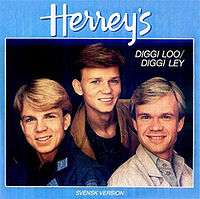Diggi-Loo Diggi-Ley
"Diggi-Loo Diggi-Ley" was the winning song in the Eurovision Song Contest 1984 performed in Swedish by a trio of brothers named Herrey's. Lyrics were written by Britt Lindeborg, and the tune by Torgny Söderberg. It was produced by Anders Engberg and Torgny Söderberg.
 | |
| Eurovision Song Contest 1984 entry | |
| Country | |
| Artist(s) | Per Herrey, Louis Herrey, Richard Herrey |
| As | |
| Language | |
| Composer(s) | |
| Lyricist(s) | |
| Conductor | |
| Finals performance | |
| Final result | 1st |
| Final points | 145 |
| Entry chronology | |
| ◄ "Främling" (1983) | |
| "Bra vibrationer" (1985) ► | |
The song is a perfect illustration of the time period in which it was performed; a very upbeat 1980s-style dance song, performed by three impossibly clean cut young men - fellow Swedish Eurovision participant Tommy Körberg famously dubbed them "the dancing deodorants" in the press, a derogatory nickname that stuck with them for the rest of their career in their home country [1] - and the nonsensical title harking back to previous entries such as "Boom Bang-a-Bang", "Ding-a-dong" and "La, la, la". The song has achieved considerable fame among Eurovision Song Contest fans, with a well-known archive of Contest lyrics using the domain name diggiloo.net, named after it. Despite the reception the song receives today, in the run-up to the Contest it was not an immediate favorite to win; bookmakers Ladbrokes had Ireland's "Terminal 3" and Italy's "I treni di Tozeur" as higher favourites, so the song winning came as a surprise to many.
According to author John Kennedy O'Connor's The Eurovision Song Contest - The Official History, The Herrey's opened the contest and thus became the third winners of the competition to sing from pole position, following Teach-In in 1975 and Brotherhood of Man in 1976. No song sung first or second has won since.[2]
The song itself deals with the lead singer discovering a pair of golden shoes in the street one day. He puts them on and immediately feels like dancing in the street, entering a "magical world". Thus, he wishes for everyone to have a pair.
The English translation, released some time after the Contest, took much the same theme, titling the song "Golden Shoes".
Richard Herrey, lead singer of the band, performed at the Congratulations special in late 2005. In 2015, all three band members performed the track with a mixture of English and Swedish lyrics at Apollo theatre in Hammersmith, London as part of the BBC's Eurovision Song Contest's Greatest Hits concert to mark the contests 60th anniversary.
The song was succeeded as winner in 1985 by Bobbysocks representing Norway with "La det swinge". The highest chart position the song reached was No. 2, in the Swedish singles chart. They reached No. 46 on the UK Singles Chart.
Single
Track listing
- "Diggi Loo - Diggi Ley" - 3:05
- "Every Song You Sing" - 3:34
Chart positions
| Chart (1984) | Position |
|---|---|
| Norway | 5 |
| Switzerland | 10 |
| Sweden | 2 |
| Austria | 10 |
| Netherlands | 4 |
Covers
- The Swedish heavy metal band Black Ingvars covered "Diggi-Loo Diggi-Ley" on their 1998 album Schlager Metal.
- Meiju Suvas has recorded a version in Finnish.
- The Danish duo Small Talk released an English cover version on their 2001 album "Eurovision."
References
- Thorsson, Leif. Melodifestivalen Genom Tiderna. Premium Publishing, Sweden. 1999 ISBN 91-89136-00-4
- O'Connor, John Kennedy. The Eurovision Song Contest - The Official History. Carlton Books, UK. 2007 ISBN 978-1-84442-994-3
External links
- "Diggi-loo diggi-ley" at the Austrian singles chart
- "Diggi-loo diggi-ley" at the Norwegian singles chart
- "Diggi-loo diggi-ley" at the Swedish singles chart
- "Diggi-loo diggi-ley" at the Swiss singles chart
| Preceded by "Främling" by Carola Häggkvist |
Melodifestivalen winners 1984 |
Succeeded by "Bra vibrationer" by Kikki Danielsson |
| Preceded by "Si la vie est cadeau" by Corinne Hermès |
Eurovision Song Contest winners 1984 |
Succeeded by "La det swinge" by Bobbysocks |